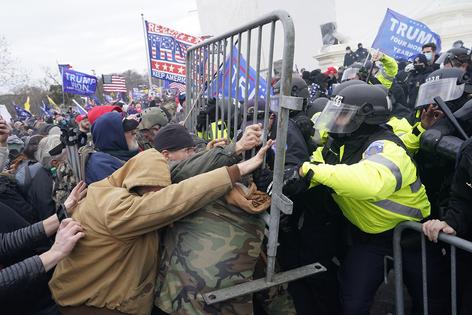Will Trump Spit in the Face of Police Officers by Pardoning January 6 Rioters?
If boasts are to be believed, “Day One” of the second coming of Donald J. Trump promises an apoplectic unraveling of the federal government.
The department of education will crumble, and career civil servants will resign in droves. Legions of immigrant parents will line up to board awaiting buses and planes or simply self-deport, bidding their U.S.-born children and employers goodbye.
Most likely, none of this will happen. Not on day one, if ever.
Legal, financial, economic, practical, and constitutional limits will temper or halt the most grandiose plans of President-elect Donald Trump.
There is one exception, however.
The presidential power to issue pardons and commute sentences is relatively unchecked.
And Trump could make good on his consistent promise to pardon those convicted of attacking the U.S. Capitol on January 6, 2021.
The prospect should make law enforcement, as well as anyone who backs the blue, go queasy.
Trump may reward hundreds of January 6 rioters for assaulting U.S. Capitol police.
He'd do this by making good on the pledge to to issue sweeping pardons, apparently even to the violent offenders.
Organizations like the National Fraternal Order of Police endorsed Trump during his campaign.
The group did so with an eye toward other measures, like protecting qualified immunity, which can shield law enforcement from being held to account for fatal shootings and sustained federal funding that flows to municipal policing nationwide.
The Trump administration is also expected to undercut the use of consent decrees overseen by the U.S. Department of Justice. These are assessments setting out reform measures, often after a police department has been found to be violating citizens’ rights.
Pardoning the rioters is also not why people voted for Trump. There is no mandate, perceived or real, for the anticipated pardons.
Trump voters, polling shows, wanted cheaper groceries, affordable housing, not forgiveness for people who attacked the law enforcement at the U.S. Capitol with bear spray, hitting them with ripped up scaffolding. In doing so, rioters caused members of Congress to shelter in place before they could escape, along with then-Vice President Mike Pence.
Several of Trump’s “Stop the Steal” wannabe patriots died that day – two by heart attack and another by an overdose. Trump supporter Ashli Babbitt died after being shot by police.
PTSD still affects many officers who were present that day. One officer died of a stroke the next day, and four others committed suicide, cases that many want classified as line-of-duty deaths due to the impact of the riots.
Yet Trump has sympathy for the attackers, often saying that those in prison are the ones suffering.
Trump might become more eager to pardon given President Joe Biden's recent record number of pardons on December 12.
There is a huge difference, however.
Biden pardoned 39 nonviolent offenders. For many, their convictions were for theft and drug offenses during their youth.
Biden’s list reads like a testament to second chances. Their life summaries (after serving sentences) detail military service, volunteering, and gaining further education. He also commuted the sentences of nearly 1,500 people who'd been released to home arrest during COVID.
Trump has begun to hedge his words.
In his “Person of the Year” interview with Time, Trump indicated that he’d focus on those convicted of nonviolent offenses. But when asked to be specific, he wavered.
“We're going to look at each individual case, and we're going to do it very quickly, and it's going to start in the first hour that I get into office,” said Trump, in a transcript of the interview. “And a vast majority of them should not be in jail.”
There are about 1,500 people charged in the January 6 attack on the Capitol. More than 600 have been sentenced to prison, for only days in some cases, decades in others.
A pardon is a gesture of forgiveness. It’s not an exoneration, nor does it erase a conviction.
Pardons are often an acknowledgment of time served, or as an act of humanity, say if an inmate is near death with a fatal illness.
Trump, in his first role as the commander in chief, appears intent on providing pardons to at least some of his most unhinged followers, some of whom are avowed white supremacists, people who have no affinity for the rule of law, or law enforcement.
Time will tell, day one will be here soon.
========
(Readers can reach Mary Sanchez at msanchezcolumn@gmail.com and follow her on Twitter @msanchezcolumn.)
©2024 Mary Sanchez. Distributed by Tribune Content Agency, LLC.
























Comments